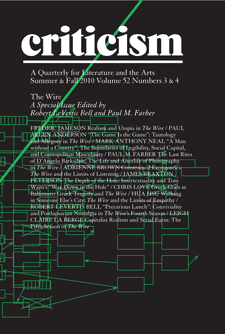Volume 52, Issue 3 (2010) The Wire
From the Preface
In The Wire's aftermath, we are faced with dueling proclivities: either to disavow nostalgia for the moment of The Wire - after all, the moment of The Wire, the moments that The Wire portrayed and critiqued, are characterized by a darkness from which looking away sometimes feels natural, healthy, prudent - and to let the past be the past; or, conversely, to arm that very nostalgia for the sake of viewing the series and its critical dispositions against a changed and charged lifescape, so as to seek some kind of vengeance on the inherited past. It's this latter tack that we feel would best reflect and respond to The Wire's particular cultural valence. The series is an unprecedented achievement in television production, narrative, and scope partially because of its nuanced and detailed second-look portrayal of progress. The series' dramatic sophistication, lucid portrayal of municipal institutions in the wake of the War on Drugs (and, eventually, the War on Terror), and critical mission offered a rare moment in our public culture to interrogate "progress," "truth," and "power," and the very idea of the past. The Wire, both as a critical model and as an object of criticism, matters precisely because of the emerging present and the constantly expanding footprint of its reflexive vantage point. This special issue of Criticism comprises its contributors' commitment to bring The Wire forward while looking backward.
Preface
Articles
Realism and Utopia in The Wire
Fredric Jameson
"The Game is the Game": Tautology and Allegory in The Wire
Paul Allen Anderson
"A Man Without a Country": The Boundaries of Legibility, Social Capital, and Cosmopolitan Masculinity
Mark Anthony Neal
The Last Rites of D’Angelo Barksdale: The Life and Afterlife of Photography In The Wire
Paul M. Farber
The Depth of the Whole: Intertextualality and Tom Waits's "Way Down In The Hole"
James Braxton Peterson
Precarious Lunch: Conviviality and Postlapsarian Nostalgia in The Wire's Fourth Season
Robert LeVertis Bell
Capitalist Realism and Serial Form: The Fifth Season of The Wire
Leigh Claire La Berge
Index
The Wire
- Guest Editors
- Robert LeVertis Bell and Paul M. Farber

